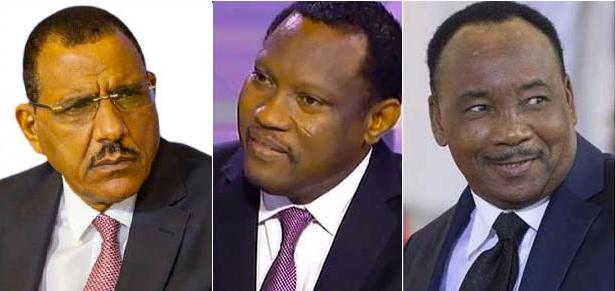President Déby uses tanks to arrest rival, as Chad becomes ungovernable
Published on Wednesday 17 March 2021 Back to articles
As Sahara Focus – February 2021 reported, Chad is heading inexorably and suffocatingly towards presidential elections on 11 April, which would see President Idriss Déby installed for a sixth term. He continues to be supported by France despite the familiar resignation and massive repression of all opposition.
On 28 February, however, that scenario changed after Déby adopted an entirely new approach to getting rid of his electoral opposition. The government claims that the courts had issued two judicial warrants against Yaya Dillo Djérou (a.k.a. Yaya Dillo) (b.1976) — one of the main candidates in the April election — but he failed to respond so police were sent to his home to arrest him. They alleged came under fire and had no choice but to retaliate.
The truth is rather different. At around 05.00 a unit of the Presidential Guard, including tanks and led by the president’s son, arrived and cordoned off the whole neighbourhood. Eyewitnesses say that the army launched an assault on Dillo’s home with several of its occupants — including his mother, three-year-old son, and three other relatives — being killed. Dillo, who claims that it was an assassination attempt, was spirited away to safety during the confusion and chaos caused by the use of tear gas.
It later emerged that the arrest warrant related to Dillo’s allegation that the First Lady Hinda Déby Itno had embezzling funds allocated to the fight against COVID-19. pandemic. The French media described the ‘limitless barbarism’ being launched by Déby against an opponent. The attack coincided with the government cutting the Internet and blocking communications, which remained disturbed for several days.
Why Yaya Dillo is a threat to the Déby regime
The key question is why Déby acted in this way and why is Dillo a threat to him? Politically, Dillo’s small Parti socialiste sans frontières (PSF) is relatively insignificant but he, personally, is not and poses a potentially serious threat. This is because like Déby he comes from the same area, is also from the Zaghawa tribe and, and is actually a relative of the president. He is a former rebel leader who rallied to Déby, a former minister, and then ambassador to Communauté économique et monétaire de l’Afrique centrale (CEMAC)).
Following the termination of his functions at CEMAC, at about the same time as the start of the COVID-19 pandemic, he retreated to his home village amongst the Zaghawa in eastern Chad, from where he began using Facebook to denounce: the government’s many injustices; and the dictatorship that prevailed within the army, administration and state governance.
In early January 2021, he participated in an opposition conference at Tiné, northeast of N’Djamena on the border with Sudan, which was broken up by Déby’s intelligence services. Two weeks later, Dillo announced his candidacy for the presidency and two days later there was the attempt to arrest him.
Dillo’s outspokenness against the Déby regime was already beginning to cause some dissension and sympathy for him amongst the Zaghawa. The regime’s assault against him has reportedly created real tensions within the Zaghawa and the Zaghawa-dominated army. As one independent researcher and specialist on Chad, told RFI, ‘For a regime like the Chadian regime, it is unacceptable for the Zaghawa community to be divided and for defections or differences to appear publicly. This is a much greater danger to the regime, obviously, than more usual and traditional oppositions from other parts of the country.’
This month there have been increasing reports of cracks emerging within the regime, army and intelligence services. Soldiers are reportedly refusing instructions from senior officers that are close to Déby. It is still too early to tell whether this is the beginning of a rebellion against Déby from within the Zaghawa tribe and there may be a more ruthless crackdown. It remains to be seen which heads will fall within the army, police, gendarmerie and intelligence services, but it may already be too late for that.
As for the 11 April presidential election, the situation is looking very fluid and uncertain. Almost immediately after the attack on his home, Yaha Dillo said he was ‘terrified by such barbarism’ and announced his withdrawal from the presidential race.
The Supreme Court has already invalidated a number of candidates, notably: Les Transformateurs’ president Dr Assyongar Succès Masra, Saad Saleh Daoud, Mahamat Nour Moustabachir, Yaya Dillo Djérou, Mahamat Abdoulkader Baba Lade and Mahmoud Ali. Several other candidates have also announced their withdrawal, leaving ten still in the race but several have since announced their withdrawal.
The government has already banned all opposition demonstrations. By the end of the first week in March, the opposition voices were beginning to express their intention to peacefully prevent the presidential election from taking place, with many promising to make the country ungovernable if Déby is declared the winner.
As we go to press, the latest development is that the establishment of a new broad opposition alliance called the Wakit Tam (‘the Moment has come’) platform — was unveiled at a press conference in N’Djamena on 12 March. Whether the moment has actually come for Déby and his regime is certainly not assured but he is currently facing an unprecedented situation. A key question in the wider international contact is whether Déby will be forced to bring back the 1,200 Chadian troops who are currently deployed into the Sahel’s three borders region, to protect him from any rebellious movements within his own security forces, or whether such dissent may have spread to the troops now garrisoned in western Niger.
This excerpt is taken from Sahara Focus, our monthly intelligence report on the Sahara region. Click here to receive a free sample copy.


